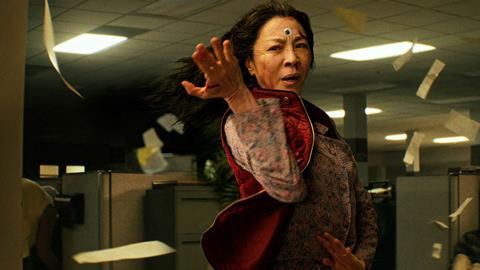Oscar-winning Everything Everywhere All at Once is totally bonkers, says Ben Cohen. But it is littered with Christian parallels that shine the hope of the gospel into the deepest darkness of human experience

Right now, the multiverse theory is still just that - a theory, in the brain-scramblingly complex world of theoretical physics. In short, along with the vastness of our own universe, there exist numberless other parallel universes with subtle, or not-so-subtle differences, to our own. Oh, and it may be possible to access these through black holes, though you really don’t want to try that.
In the worlds of sci-fi and fantasy, this idea is now an established fixture. Heroes and villains can jump between alternative realities, meet and fight against or alongside different versions of themselves and reappear from another universe after they have been unwisely killed off.
In Everything Everywhere All at Once, Oscar-winning writers and directors, Daniel Kwan and Daniel Scheinert, have chosen to do something a little more original (and thought provoking) than the likes of Doctor Strange and Spiderman.
Evelyn choses to have her whole being cracked open to save the world. I trust you see the divine parallel
And whether it crossed their minds or not, they have painted a multiverse that somehow evokes the presence of God. Through its portrayal of a very human love, it points to a God who loves every single human being so fiercely that he immerses himself in every single different version of the universe to do it.
A life less ordinary
Evelyn Wang’s life is not going well. She has emigrated from China to the USA, where she runs a failing laundromat with her long-suffering husband Waymond. Waymond, for all his constant good cheer, is filing for divorce.
Their daughter, Joy, is also unhappy. This is brought to a head when Evelyn introduces Joy’s long-term girlfriend to her elderly father as Joy’s “good friend”. Meanwhile, Evelyn and Waymond are preparing to file their questionable tax return to the Inland Revenue Service (IRS). Their livelihood is at stake and, with Evelyn’s imaginative accounting, things are not looking good.
If you’re thinking at this stage that Everything Everywhere sounds like a not terribly original indie drama, hold tight (or if you don’t want plot spoilers, you may wish to disembark altogether). Things are about to get complicated. And weird.
Cracked wide open
As Evelyn and Waymond take the lift to their IRS interview, Waymond’s body is taken over by “Alpha-Waymond”, a parallel version of himself from another universe. Evelyn’s universe, and every other universe in existence, is at threat of being destroyed by the “evil” Jobu.
Jobu had been learning to “verse jump” between realities. However, the experiment goes tragically wrong and Jobu, her consciousness now “cracked”, experiences every possible plane of existence at once. The pain and sadness of this moves her to create what she calls an “everything bagel”, a kind of black hole, which has the power to destroy not just a few galaxies, but the whole multiverse itself.
Like the multiverse-gobbling bagel, this film is topped with a bit of everything: absurdist fantasy, martial arts, surreal comedy, and a love story (of sorts). But, at its core, lie two beating hearts (a bit like Dr Who) and both are deeply Christlike.
In the pain
To defeat the evil Jobu, Evelyn learns that she, too, must become “cracked”, and experience every single version of the multiverse. Only by doing so can she understand why Jobu would want to end everything, everywhere. Evelyn chooses to have her whole being cracked open to save the world – well, all the worlds. I trust you see the divine parallel there.
The "evil Jobu" turns out to be Evelyn’s daughter, Joy. In a myriad of different realities, they are still mother and daughter and, in each one, their dysfunctional relationship leaves Joy miserable.
Jobu/Joy doesn’t want to destroy the multiverse; she wants to find a version of her mother who can see what Joy has seen: that every version of existence is absurd, pointless and painful. Then they can both launch themselves into the bagel shaped void together to end the pain of existence.
Evelyn, having spectacularly failed in her life, is seduced by this idea and fights viciously to bring it about. However, in one of her many universes, she meets a version of her husband Waymond, whose constant, whimsical upbeat nature she has dismissed as weakness.
Choose joy
“You tell me that it’s a cruel world…When I choose to see the good side of things, I’m not being naïve,” says this version of Waymond. “It is strategic and necessary…you go through life with your fists held tight. You see yourself as a fighter. Well, I see myself as one too. This is how I fight.”
Evelyn is the original “hound of heaven”, entering into every possible reality and chasing her daughter with a fierce, relentless love
Waymond has chosen to fight despair with hope, and brutality with kindness. And he inspires Evelyn to do the same. She battles her adversaries by healing them, fixing one assailant’s back problems in mid battle like a ninja osteopath. Yes, this film is, amongst many things, a comedy.
Evelyn has learned the message of 1 Peter 3:9: "Do not repay evil with evil or insult with insult. On the contrary, repay evil with blessing.” It is a choice that turns her battle against the forces of despair around, and brings a resolution to the film that left me in tears.
Into the void
Having undergone a truly biblical change of heart, Evelyn still needs to rescue her daughter from plunging in to the void. In one universe, she forcibly pulls Joy away from the bagel of annihilation. However, the real power is played out in the original universe, in their laundrette.
“I’m tired,” Joy tells her mother. “I don’t want to hurt anymore. And for some reason, when I’m with you, it hurts both of us. So let’s just go our separate ways…Please.”
“Out of all of the places I could be, why would I want to be here with you?” asks Evelyn “You are right. It doesn’t make sense.” However, she adds: “No matter what, I still want to be here with you. I will always want to be here with you.”
Joy is eventually saved by the burning unconditional love of a mother for her prodigal child. By using the Sermon-on-the-Mount (ish) rulebook of her husband, Evelyn becomes the original “hound of heaven”, entering into every possible reality and chasing her with a fierce, relentless love. She is a mother hen that risks everything to gather her baby chick under the protection of her wings (Matthew 23:37).
Like Joy’s nihilistic view of life, Everything Everywhere All at Once is, to use a colloquial term, totally bonkers. In this respect, it follows many absurdist films, plays and novels before it. However, for most of these other works, the message is loud and clear: “Life is quite absurd / and death’s the final word”, to quote Monty Python.
Everything Everywhere stares into the darkness and, like the persecuted Christians I encounter in my job at Open Doors, it dares to see hope instead of despair. For that, it deserves every Oscar the multiverse can shower upon it.






































No comments yet